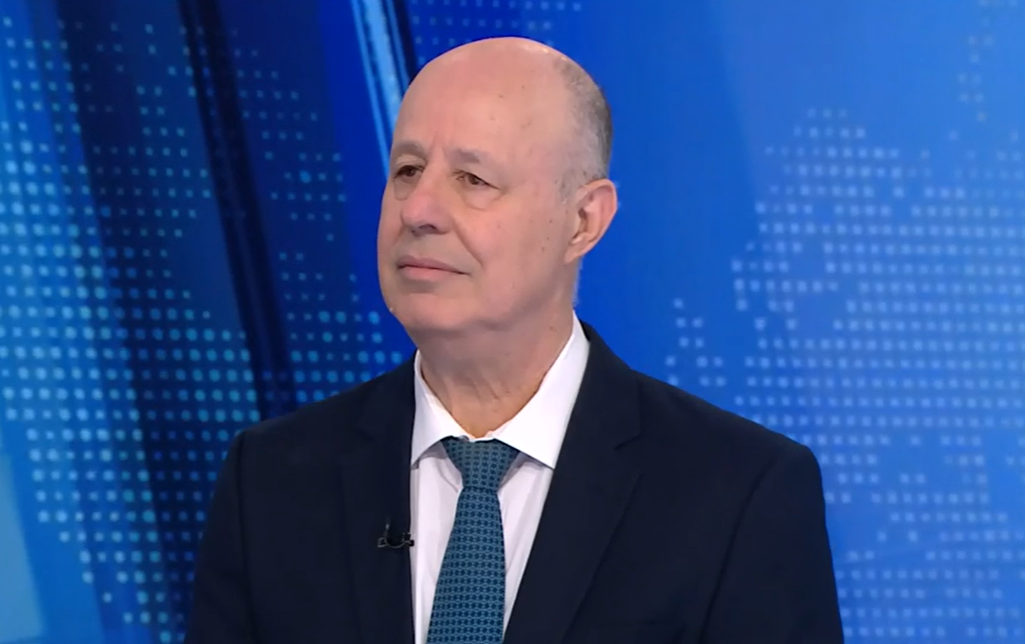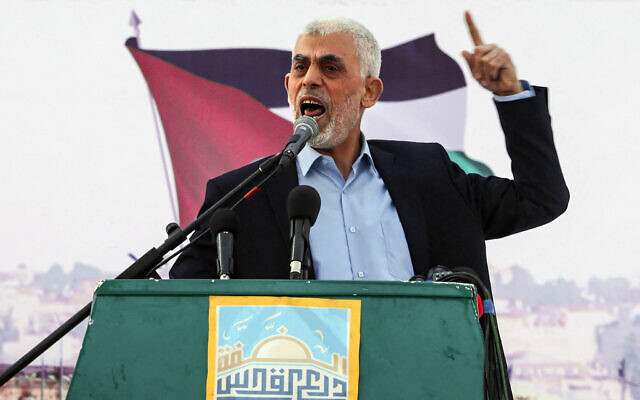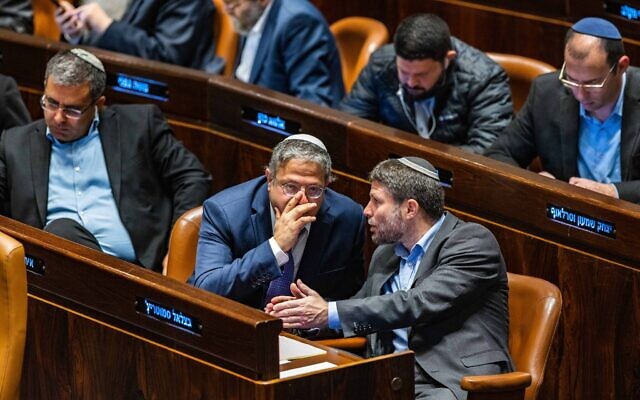



National Security Adviser Tzachi Hanegbi indicated Saturday that the Israel Defense Forces had in recent months nearly caught Hamas’s Gaza chief Yahya Sinwar.
At the same time, Hanegbi said Sinwar was delaying a hostage and truce deal because he was “in distress.”
In an interview with Channel 12, Hanegbi — a former Likud MK and minister whom Prime Minister Benjamin Netanyahu appointed at the start of the parliamentary term to lead the National Security Council — stressed that Israel would go forward with its planned operation in Rafah. He also pushed back against the argument that Netanyahu’s far-right partners, rather than Sinwar, were thwarting the government’s approval of a deal that would spell a pause to the fighting in Gaza and the release of some hostages.
“It is apparently hard for [Sinwar] to make a decision [on a hostage deal] that is likely to mean the end of Hamas rule,” said Hanegbi, “because the minute he gives up on the highly significant card for his survival, our hostages, it’s not easy for him, and that’s why things are delayed.”
Hanegbi said Sinwar “is living on borrowed time,” that Israel had come close to eliminating him in recent months, and that “he won’t emerge alive from this confrontation” — a prospect which the Wall Street Journal recently reported does not bother the Hamas chief, who believes he has already won the war.
“His fate is sealed. But we must be patient,” Hanegbi told Channel 12, noting that it took the United States a decade to catch 9/11 mastermind Osama Bin Laden.
When it was put to Hanegbi that Sinwar, who orchestrated the October 7 massacre, has done more damage to Israel than any individual ever, and that his adherents perceive him as a modern Saladin — the 12th century Muslim conqueror of Jerusalem — Hanegbi retorted that “this Nazi murderer” Sinwar should not be pumped up.
On October 7, thousands of Hamas-led terrorists stormed southern Israel to kill nearly 1,200 people, mainly civilians, and take over 250 hostages, amid rampant sexual violence and other atrocities.
“He caused more than 40,000 of his own people to be killed, and didn’t care,” said Hanegbi, citing a figure higher by some 6,000 than the unverified totals cited by Hamas.
“14,000 terrorists were killed — which hurts him more,” added Hanegbi.
Twice in the interview Hanegbi argued that Israel has known harder times than the current period, citing the 1973 Yom Kippur War and the Second Intifada. He claimed that Israel was achieving the “ambitious” goals of its war against Hamas — returning the hostages, destroying Hamas’s military and governance capabilities, and “above all” ensuring no future threat from Gaza of the massacre of Israelis.
Hanegbi said discussion of governance in Gaza — ”the day after” the war — is “important but virtual” at this stage.
“Did the Americans, when they were fighting the Nazis for four years, establish what would happen the day after? They first had to defeat the Nazis. We have to defeat the new Nazis — Hamas. No Saudi, Emirati, Jordanian or Fatah official will go in and take control of Gaza so long as Hamas is there… with functional battalions… and can shoot them in the head,” said Hanegbi.
He added that an Israeli civil administration of Gaza “is not the right thing; we shouldn’t be running Gaza’s sewage systems.” But Israel must maintain overall security control of the Strip because “nobody but us will fight to destroy the remainder of Hamas” when the main thrust of the war is completed.
Netanyahu has been resistant to delineating a specific plan for Gaza’s post-war governance. Some Israeli security officials have proposed transferring civilian authority in the Strip to local clans, which analysts have said is unrealistic. The United States has said a “revamped” Palestinian Authority should take charge of the Strip, which Netanyahu vehemently opposes. Netanyahu’s far-right coalition partners have called for Jewish resettlement of the embattled enclave, from which Israel unilaterally withdrew in 2005.
Asked about the war’s progress, Hanegbi denied that the IDF is treading water, saying “it is a fact” that Israel has decided to carry out its planned operation in Rafah. “The prime minister, backed by all cabinet ministers, has ordered the IDF to carry out the operation in Rafah,” he said, and “it could be very soon.”
There was a firm date, he added, but it had been postponed because of Israel’s unprecedented direct confrontation with Iran throughout April.
Israel’s impending offensive in Rafah — the Gaza Strip’s southernmost city, where over a million Palestinians have sought refuge after Israel drove them out of the enclave’s north and center — has aroused opposition even from Israel’s staunchest ally, the United States, which is wary the ground maneuver could exacerbate the Strip’s humanitarian catastrophe, and unconvinced that Israel could carry out an adequate evacuation of civilians.
Egypt, which abuts Rafah, has also been adamant in its opposition to the long-touted operation, fearing displaced Palestinians would flee en masse into the Sinai Peninsula.
Both countries, along with Qatar, where some of Hamas’s leadership is based, have for months mediated talks for a hostage-truce deal between Israel and the Palestinian terror group. In November, the parties succeeded in securing a weeklong ceasefire during which Hamas released 105 hostages in return for some 240 Palestinian prisoners in Israeli captivity.
According to Hanegbi, a hostage deal now would undoubtedly require a truce: “If there is a deal, the deal will require a humanitarian pause in the north, south and center [of Gaza],” said Hanegbi.
“If there is an agreement to what the Americans called ‘very generous terms,’ it won’t be easy for any minister to vote in favor of this deal, but it frees living people,” said Hanegbi, quoting US Secretary of State Antony Blinken.
“And, therefore, if Hamas agrees to the deal as it is — and that does not include ending the war, because the government’s policy is to complete the war in order to achieve the goals of the war — there’ll be a humanitarian pause for the specified period,” continued Hanegbi.
He said Blinken knows Israel will soon move into Rafah, since the secretary drove past the tanks “on his way to Kerem Shalom” when visiting Israel over the past week.
“He won’t be surprised,” said Hanegbi.
Hanegbi denied the interviewers’ assertion that Netanyahu will not go ahead with a truce and prisoner swap deal with Hamas for fear that his right flank, headed by Finance Minister Bezalel Smotrich and National Security Minister Itamar Ben Gvir, would bolt the government in protest.
“Did the prime minister give a green light to the negotiating team to advance the deal, knowing that it could have political repercussions?” asked Hanegbi rhetorically. “We know that the answer is yes,” he said.
Smotrich in a statement Saturday said “a capitulation deal that will end the war is a disaster.” Ben Gvir warned that Netanyahu “knows well the price of failing to live up to his promises” not to agree to “a reckless deal.”
Hanegbi also denied that Sinwar would be encouraged to reject any agreement given Israel’s insistence on invading Rafah with or without a deal, which the Prime Minister’s Office reiterated in a rare Saturday statement.
“One of the goals of Rafah operation is to boost the chances of a deal,” said Hanegbi, “because when Sinwar hears that he can prevent the IDF going into Rafah by saying yes to a deal, that’s almost the only major means we have of pressuring [him].”
Hanegbi explained that the Rafah operation is necessary to cut Hamas off from the Egyptian border — its “oxygen” for arms supplies. He added that the four functioning Hamas battalions in Rafah also must be destroyed.
Asked whether Israel’s current proposal to Hamas is overly generous — even when Sinwar has been reportedly resisting it — Hanegbi said, “we’re not begging for a deal” and “there are conditions we won’t accept.”
He noted that the deal on offer provides for only unarmed civilians to return to northern Gaza.
Hanegbi said the cabinet has decided that the IDF currently needs to focus on Gaza, but that Israel will also have to deal with the northern border, where Hezbollah has been carrying out near-daily attacks since the start of the conflict, leading tens of thousands to evacuate.
He rejected the idea of returning people to their homes near the northern border and daring Hezbollah to fire, with the threat of a major military offensive if it does, saying this would be an unconscionable risk.
Israelis have been “fighting for our lives for 75 years,” Hanegbi said, adding that “there were periods that were many times worse than these days,” and that “people were slaughtered in Israel not just on October 7.”
During the Second Intifada, which rocked Israel for five years following the collapse of the 2000 Israeli-Palestinian peace talks at Camp David, “I couldn’t put my children on a bus to school because buses were blowing up,” said Hanegbi.








